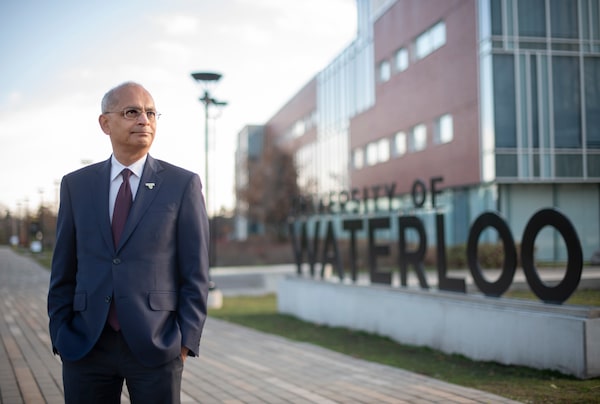
Vivek Goel, the President Designate for the University of Waterloo, is photographed on the campus on Nov 11 2020.Fred Lum/The Globe and Mail
Faced with a pandemic that has transformed higher education, the University of Waterloo has chosen a new president renowned for his expertise in public health as well as academic research and administration.
Vivek Goel, until recently vice-president for research and innovation at the University of Toronto and a leading public-health expert, was on Tuesday named the next president and vice-chancellor of the Waterloo, Ont., school, beginning in 2021.
A physician by training, Dr. Goel has worked on COVID-19 research in recent months after stepping down from his senior administrative role at the University of Toronto.
He has extensive experience in academic leadership, having also previously held the post of provost at U of T. In the aftermath of SARS, he was named founding president of Public Health Ontario and has also worked in the private sector.
Dr. Goel said in an interview that he looks forward to shaping a postpandemic university that will tackle some of society’s most important challenges: training students for an uncertain world and setting a research agenda that contributes to the well-being of the community.
“What’s become clear to me is just trying to fix public health alone is not going to help build a more resilient society. We really need to think about this broader set of societal issues that COVID-19 has laid bare and think about what we need to do from an education perspective, what kinds of research teams need to be brought together, to address these really big challenges,” Dr. Goel said.
The university has more than 40,000 graduate and undergraduate students in full-time and part-time studies and a reputation for research in engineering and technology, in particular. Dr. Goel will replace Feridun Hamdullahpur, president since 2010, next July.
One of the first challenges he’ll face when he takes up the post is how to safely manage a transition to fall 2021 classes that could potentially be held in-person, depending on the progress of COVID-19 vaccines. Dr. Goel has said he has always favoured a balanced response to the pandemic, and it has become clear that students value the face-to-face learning that takes place outside a lecture setting.
“We have to figure out how we can preserve as much of those critical activities as possible,” he said.
It’s also clear that the educational transition universities have executed in response to COVID-19 has shown that higher education can be delivered differently, at least in some cases. That presents opportunities, Dr. Goel said.
He said he can imagine a future in which education is not delivered solely in four-year degree programs, but as a continuing process of lifelong learning, blended with off-campus experiences such as Waterloo’s renowned co-op program.
One area where he sees potential for the university to grow is in its commitment to research at the intersection of health, technology and society. Dr. Goel said he has no plans for a medical school at Waterloo, but there are many other ways to have an effect on health-related research.
“Waterloo has a great opportunity in this postpandemic world in thinking about those broader determinants of health. In terms of its research and its academic programs it can focus more broadly and without the predisposition of starting with a medical school. Because when you start with a medical school, you tend to go to the medical solutions for a lot of things right away,” he said.
When the pandemic hit, Dr. Goel was one of the relatively few public-health experts not working on the front lines, so he stepped back from his administrative duties to contribute to public-health research and networking. That was also when he was first approached about taking on the presidency at Waterloo. The timing wasn’t right initially, he said, but he was persuaded by the school’s five-year strategic plan, with its agenda for developing talent, research and community engagement.
“In the long term I can make a greater contribution to public health through trying to support Waterloo, and the broader university sector across the country, in thinking through how we live in this postpandemic world,” he said.
Our Morning Update and Evening Update newsletters are written by Globe editors, giving you a concise summary of the day’s most important headlines. Sign up today.
 Joe Friesen
Joe Friesen